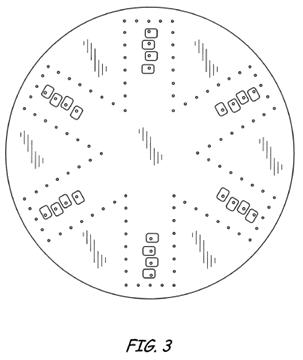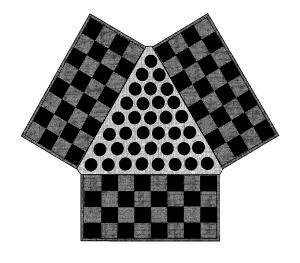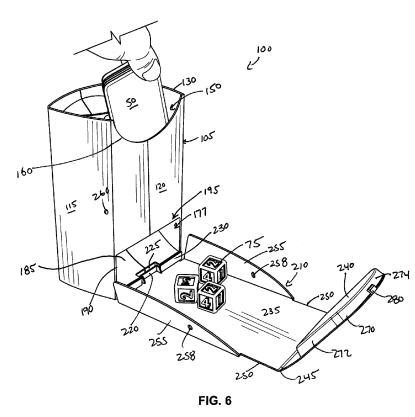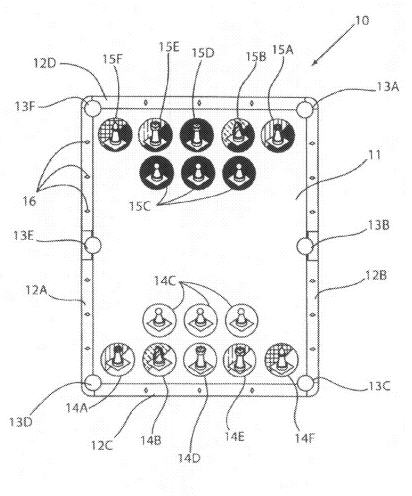Welcome to Purple Pawn, covering games played around the world by billions of people every day.
May Board and Card Game Patents
31 May
Posted by Yehuda Berlinger as Card Games, Classic Board Games, Electronic Games, Modern Board Games
Craps game based on results from a sporting event – This is at least the third, and more likely the tenth, patent granted to CFPH (Cantor-Fitzgerald Patent Holdings) for essentially the exact same idea. Last time it was a roulette wheel, before that it was a pari-mutuel gaming device. One would think that, after the first of these, the rest of them would fail the obviousness test. At least, they should be amendments to the original patent.
Bingo prize mapping system with additional ball draw – I’m really not sure. I think the idea is that, after you have won a game of Bingo, an additional ball is drawn with the possibility of an additional prize if you then have a certain pattern on your card.
Poker game with variable payouts based on probabilities of winning – An odd variation of playing poker against the dealer, where the player has hands of different sizes, cards are added to the dealer hand until all player hands are beaten, and then hands are paid out out according to the number of cards in the dealer’s hand.
Logical board game and game of chance on a star-shaped board – By Laszlo Polgar, father of the three famous Polgar sisters, and Chess master and author in his own right. This patent is for Polgar Superstar Chess, a board on which several Chess variants, and other games, may be played.
Logical board game and game of chance on 6.times.6 and 5.times.7 boards – Another patent by Polgar, this is for the concepts in his book Reform Chess. More info.
Board game – A design patent, from Culdesac Games. I don’t know much about the game, but the box design is by David Paul Seymour. The patent is assigned to Daniel Benson in MN, who I believe is a volunteer firefighter, as well as a mentor and spokesperson for Kids n Kinship.

Virtual world reversion rights and Virtual world property disposition after real-world occurrence – These aren’t patents for board games, but they bear mentioning. The patents are assigned to The Invention Science Fund I, LLC, which is essentially a shell company for other shell companies that appear to do nothing but register patents. The patents are 150 and 80 pages long, respectively. The first seems to be (according to my untrained examination) a patent on buying virtual goods using a credit card. Maybe I’m missing something. The second is arranging to transfer virtual goods to someone after the real-world death of their owner.
Golf game and method of playing – Kind of a Bingo game where each card represents a golf professional, the columns are tournaments, and the rows are years. “WIN” appears in the appropriate places in the grid, and you need to get all of these marked in order to win.
The background starts with the usual insipidness about what a board game is, and goes on to tell you the major benefits of electronic games:
In recent years, electronic games have seen a huge rise in popularity. While board games retain their appeal and will most certainly remain popular in the future, their electronic counterparts open up games to a wider audience. Additionally, electronic embodiments of popular games are desirable because they allow for gameplay when utilizing the physical game may not be appropriate (for example, playing the card game solitaire while at work). Therefore, there is a demand for games that can be offered in a plurality of mediums, whether they are physical or electronic.
Card game with counting – Another CFPH patent. I have absolutely no idea as what this patent is about, as it seems to consist entirely of descriptions of prior art. It might have something to do with statistics and tracking card counting.
Checkers for three players – By James Turner.

I designed a three-player Checkers game once, and discovered the two problems with these types of games: 1) player elimination, with two players ganging up on a third, and 2) the converse, which is that each player defends the weaker opponent from the stronger opponents, leading to an essential stalemate.
Playing card dealing shoe with automated internal card feeding and card reading – Shuffle Master has claimed dozens (hundreds?) of patents for card shufflers and dealers, so it’s hard to imagine what more they could have to give us. It looks like the only claim to originality in this one is that it doesn’t shuffle the cards, only deals and tracks them.
Self-contained dice tumbler – From Fundex Games. The dice tower from All In.

Wagering game having rule set modification – The Monopoly slot machine. Patenting the idea of buying properties on a slot machine to affect the outcome of the slots.
Scoring system for games – From Microsoft. You math geeks will like this one.
It’s a patent for a computer to automatically determine the score in a game of Go after both players have passed. The essential part being that it determines the winner for all areas of seki.
Microsoft? What are you going to do with this?
Inventory management of virtual items in computer games – Also not a board game patent, also worth mentioning, and also from Microsoft. A patent for applying filters for your collected items in games. Duh.
There you go. That’s more like Microsoft.
Game of chance – A Bingo variant, which should be eminent from the abstract:
In accordance with the principles of the present invention, a game of chance is provided. Cards for use in the game of chance have rows and columns that define “boxes having numbers contained in the boxes. A random number generator generates an initial number of numbers, preferably two. The initial numbers correspond to the numbers contained in the boxes, thus representing a numerical spread based on the position the numbers correspond to on the card. Depending on the numerical spread based on the position the numbers correspond to on the card, either a payoff is determined, a push is called or at least an addition number is generated. If the additional number is generated, either a payoff is determined or a push is called.
Billiard game with chess indicia and method of play – That kind of says it all, actually. Each ball has rules of movement (how it can be played) and the object is to pocket the opponent’s king. Cool.

Mini-hold ’em games – A patent for Mini-TEX 3-Card Hold-‘Em (best three card hand from two hole and three community cards).
System and method for playing a game including a mortgaging option – Some method of allowing a Blackjack player to deal with a bad initial hand.
Method of playing yangtze hold ‘EM# and tibet high# poker games – A variant of a game I covered back in May, 2008. His incredibly long background material about “we, the earth people” is hysterical. By Gamelot.
1 Comment
Sorry, the comment form is closed at this time.
Trending
- Massdrop.com
- Oh the Irony—Illuminati Card Game Continues to Inspire Conspiracy Theorists
- Footprints, an Educational Ecology Game
- USPS Adds Board Game Flat Rate Box
- Home
- Baila, the Estonian Drinking Card Game
- Crystal Caste Wins Dice Patent Suit Against Hasbro
- Mirror Game, Red and Blue
- Hasbro and Mattel Merger?
- Are Board Games Dangerous?
Archives
Most Popular Articles
- Oh the Irony—Illuminati Card Game Continues to Inspire Conspiracy Theorists
- The 20 Most Valuable Vintage Board Games
- The Truth About Dominoes On Sunday in Alabama
- Sequence Game, and Variants
- USPS Adds Board Game Flat Rate Box
- Baila, the Estonian Drinking Card Game
- The 13 Most Popular Dice Games
- Are Board Games Dangerous?
- Guess Who? The Naked Version
- What Happened to the Jewel Royale Chess Set?
Recent Posts
- Toy Fair 2019—Breaking Games
- Talisman Kingdom Hearts Edition
- Toy Fair 2019—Winning Moves
- Toy Fair 2019—Games Workshop
- Toy Fair 2019—Star Wars Lightsaber Academy
- Toy Fair 2019—Stranger Things Games
- Toy Fair 2019—HABA
- Licensing Roundup
- Game Bandit
- 2018 A Difficult Year For Hasbro But Not For D&D Or MtG
Recent Comments
- on Toy Fair 2019—Winning Moves
- on Game Bandit
- on Second Look—Dungeons & Dragons Waterdeep Dragon Heist
- on Crowdfunding Highlights
- on Beyblade SlingShock
- on Game Bandit
- on Game Bandit
- on Watch This Game!, the Board Game Review Board Game
- on Second Look—Vampire: The Masquerade 5th Edition
- on Palladium Books Loses Robotech IP License, Cancels Five-Year-Overdue Robotech RPG Tactics Kickstarter





[…] This post was mentioned on Twitter by Grandma's Toys, jimmy, moon, Rebeca Poke, Purple Pawn and others. Purple Pawn said: May Board and Card Game Patents: Craps game based on results from a sporting event – This is at least the third, … http://bit.ly/bMgEnG […]